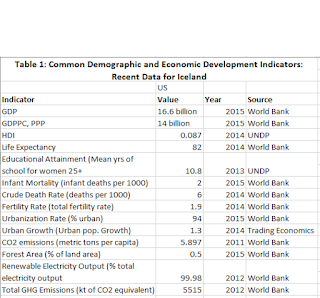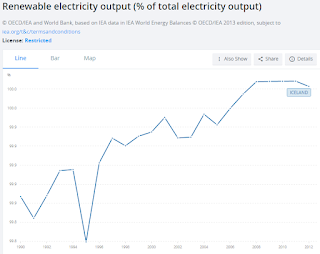 |
| Data from the WHO This chart shows the proportional mortality in percent of different causes in Iceland |
Monday, October 31, 2016
Sustainability and Health
According to the WHO country profile for Iceland, their health statistics remain in good standing in comparison to the WHO region. Overall, Iceland's health has been improving since independence in the mid 1900s and is currently highly rated in most health standards. Despite this, the leading causes of death among both males and females are currently cardiovascular diseases which account for 33% of deaths. Second to cardiovascular diseases is cancer which accounts for 30% of deaths. These are both non-communicable diseases which means prevention and treatment are not as simple as communicable diseases because causes vary. The Icelandic Cancer Society is working to research, inform, and prevent cancer in Iceland. Tobacco use, especially among women is a leading cause of cancer (WHO). Other factors are also to blame for these deaths which are currently being researched more by the Icelandic Cancer Society.
Wednesday, October 19, 2016
Social Inclusion and Sustainable Development
Despite Iceland's high Gini coefficient, there have still been recent problems of social inclusion. Recently, a new tax policy changed the income threshold, lowering the income level at which people are exempt from paying income tax. Not only has the income tax level changed, but after the 2008 economic collapse, there were significant cuts in pensions and other public expenditures. "In Iceland, the richest 1% of taxpayers own nearly a quarter of all assets, while the richest 10% own nearly three-quarters of all assets. In contrast, 30% of taxpayers owe more than they own" (SGI). This social inclusion problem could either have a positive or a negative effect on sustainability depending on the allocation of the taxes. If the taxes go towards sustainable infrastructure and other sustainable practices, the country has the potential to improve as a whole, but if they do not, this leaves low income families with less of a chance to contribute to sustainability because of the strain paying taxes puts on their income.
http://www.sgi-network.org/2015/Iceland/Social_Policies
Tuesday, October 18, 2016
Environmental Constraints
Iceland is on the forefront of the energy revolution and sustainability. Because of their reliance on geothermal power, their CO2 emissions remain relatively low. As Iceland continues to reduce emissions, their fertility rate is also decreasing below replacement rate. This means consumption could potentially be reduced even further. Having such a small population allows for easier economic growth and transition to sustainable practices. The environmental constraints that Iceland faces are relatively minute in comparison to other larger, less sustainable countries, but there is always room for improvement. Iceland is working hard to further reduce these emissions and therefore improve the environmental constraints associated with energy production.
Sources: FAO Statistics and UN Population Projections
Sources: FAO Statistics and UN Population Projections
Monday, October 10, 2016
Nordic Economies
When comparing Iceland to the other Nordic countries, there are some striking similarities and differences. Despite being geographically similar and relying on natural resources for the majority of their original economy, there are still differences between origin and sustainability. In the beginning, countries such as Norway were the original colonizers whereas Iceland was the colony. Currently, the Nordic countries share the economic practice of the Nordic Model which is also referred to as Nordic Capitalism or Nordic social democracy. This system helps to provide free market capitalism as well as access to programs such as free education and free healthcare. The Nordic governments are working in conjunction with this system to also promote sustainability. The Nordic countries see sustainability as something that correlates with economic growth even though Norway relies on it's oil reserves. The countries are working to reduce the natural resource industries and increase renewable energy with Iceland leading the Nordic countries with 87% of their total energy supply coming from renewable energy sources. The other countries are lagging behind but still improving.
Tuesday, October 4, 2016
Sustainability and Economic Development in Iceland
Iceland was not settled at the same time as Western Europe.
It took until the late 8th century for people to spread from Europe
and settle the island. Throughout its early years, Iceland was under Norwegian
rule, followed by Danish rule. The country only gained its independence on June
17th, 1944. In this regard, Iceland is a relatively new independent
republic (http://www.localhistories.org/iceland.html).
Despite gaining their independence, Iceland’s main exports and economic
activities have remained centered around the fishing industry. For the most
part, Iceland’s economy did not change much due to its reliance on natural
resources and the constraints of culture (http://www.hartford-hwp.com/archives/61/266.html).
Animal husbandry was a main means of support in conjunction with fishing.
Currently fishing and fish products account for around 50% of foreign currency
revenues (http://waterfire.fas.is/Iceland/).
Because Iceland’s industry is so heavily focused around natural resources, no
fortune 500 companies are located there. The land mass is also inconveniently
located for quick trade global trade. All of these factors have helped place
Iceland where they are today in terms of sustainability. Because they have to
rely so heavily on imports for energy and other materials, it has helped them
to become more reliant on renewable energy sources in order to keep more
processes domestic. The geographic and natural resource constraints have helped
to shape Iceland’s sustainability and way of life.
Monday, October 3, 2016
Development Metrics of Iceland
Below is a table of the demographic, economic, and environmental indicators of Iceland in recent years.
These two graphs also show interesting environmental information about Iceland.
Subscribe to:
Comments (Atom)



